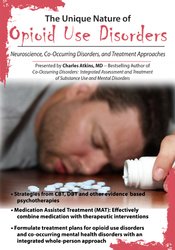

Painkillers can kill more than just pain. Death from opioid overdoses have bypassed those from motor vehicle accidents. Dangerous synthetic drugs have flooded the streets — someone’s first use may be their last.
Ruined lives, broken families, incarceration, and premature death. These are the extreme, life destroying consequences of opioid addiction. And opioids do not discriminate. Everyday problems like back pain, even a toothache, can lead a person down the path of opioid abuse. It can happen to anyone.
Your connection to the issue is personal - witnessing the tortured deterioration of clients, friends, and family struggling with addiction. You want to help, but knowing about other types of addiction isn’t enough. Opioid use disorders are distinct from other substance abuse disorders; a combination of brain change and physical dependence have created an epidemic of unprecedented proportions. Complicating things further, most individuals with opioid use disorders have at least one co-occurring mental health problem that must be addressed.
Are you prepared to end the suffering and tackle the unique and complex challenges of opioid addiction?
Board-certified psychiatrist, published author, and clinical trainer Dr. Charles Atkins has in-depth personal experience helping clients grappling with the devastating effects of opioid use disorder. Join him as he walks you through the specifics of how to craft effective evidence-based treatment strategies to treat opioid addiction and co-occurring disorders.
Watch this vital seminar and walk away with:
Get the tools and techniques you need to help your clients before it’s too late!
This online program is worth 6.25 hours CPD.
| File type | File name | Number of pages | |
|---|---|---|---|
| Manual (4.88 MB) | 56 Pages | Available after Purchase |

Charles Atkins, MD, is a board-certified psychiatrist, clinical trainer, Chief Medical Officer of Community Mental Health Affiliates (CMHA), member of the Yale volunteer faculty, and a past regional medical director for the Department of Mental Health and Addiction Services (CT). A frequent lecturer on opioid addiction and Medication Assisted Treatment, Dr. Atkins is the author of Opioid Use Disorders: A Holistic Guide to Assessment, Treatment, and Recovery (PESI, 2018) and Co-Occurring Disorders: Integrated Assessment and Treatment of Substance Use and Mental Disorders (PESI, 2014) which has been included in the core curriculum of multiple schools of social work and substance abuse counseling. He is also the author of more than 15 other traditionally published books, both fiction and nonfiction, and has had hundreds of short stories and articles appear in publications ranging from The Journal of the American Medical Association (JAMA) to Writer’s Digest Magazine.
Speaker Disclosures:
Financial: Dr. Charles Atkins is the managing member of Atkins Unlimited, LLC. He is a practicing psychiatrist and an instructor at the Yale University School of Medicine. He serves as the CME Medical Director for PESI, Inc., and he receives a speaking honorarium from PESI, Inc. He is a published author and receives royalties. he has no relevant financial relationships with ineligible organizations.
Non-financial: Dr. Charles Atkins has no relevant non-financial relationships.
Please Note: PESI is not affiliated or associated with Marsha M. Linehan, PhD, ABPP, or her organizations.
| 5 |
|
| 4 |
|
| 3 |
|
| 2 |
|
| 1 |
|
Satisfaction Guarantee
Your satisfaction is our goal and our guarantee. Concerns should be addressed to info@pesi.co.uk or call 01235847393.
Please wait ...